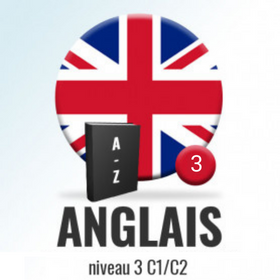
Formation Reflex’English – Level 3
Objectifs pédagogiques
Reflex’English Level 3 s’adresse aux apprenants ayant validé les compétences du niveau intermédiaire. Il est également recommandé pour ceux qui souhaitent réviser ou consolider les connaissances abordées en niveau Level 2.
Reflex’English Level 3 permet d’atteindre le niveau C1/C2 du CECRL, il est composé de 24 leçons d’apprentissage et de 6 leçons de test, avec de nombreuses animations de situations, de grammaire et de vocabulaire. Parmi les objectifs de ce niveau : tenir une conversation simple sur des sujets liés au travail, à l’école, aux loisirs, faire face à des situations au cours d’un voyage dans un pays anglophone, s’exprimer à l’oral et à l’écrit de manière simple sur ses expériences et ses ambitions, formuler de courtes explications ou justifications relatives à un projet ou une opinion.
Prérequis
Aucun
Avoir le niveau Reflex’English Level 2
Prérequis technique
• Navigateur web : Internet Explorer, Chrome, Firefox, Safari
• Système d’exploitation : Mac ou PC, smartphone
Temps de formation
Modalités d'évaluation
Quizz interactif en ligne avec certification
Certification à la clé
Quizz interactif en ligne
Certification ENI en ligne avec e-surveillance
Les modalités des Certifications Bureautiques sont uniques :
l’examen de certification s’appuie sur une solution qui permet au candidat de manipuler directement dans le logiciel. Les compétences sont ainsi réellement évaluées et validées.
Technologie
• HTML5
• Norme SCORM
Modalités d'accès
14 jours après signature de la convention
Situation d’handicap :
formation accessible aux PSH , veuillez nous contacter pour étudier votre demande et les besoins de compensation
Méthodologie mobilisée
30 Modules comprenant de multiples jeux‐exercices
interactifs et stimulants.
24 leçons d’apprentissage
6 leçons de tests
A partir de
Pack Basic
-
90 jours d'accès à la plateforme
-
Accompagnement Asynchrone
-
Certification officielle incluse
-
Accès depuis tous vos appareils
-
Assistance sous 48H maximum
-
Coaching personnalisé
Pack Essentiel
-
90 jours d'accès à la plateforme
-
Accompagnement Asynchrone
-
Certification officielle incluse
-
Accès depuis tous vos appareils
-
Assistance sous 48H maximum
-
2H de Coaching personnalisé
Pack Avancé
-
90 jours d'accès à la plateforme
-
Accompagnement Asynchrone
-
Certification officielle incluse
-
Accès depuis tous vos appareils
-
Assistance sous 48H maximum
-
4H de Coaching personnalisé
Commencez à acquérir de nouvelles connaissances et expériences, ensemble !
-
Lesson 01 – Chatting with people living in France: Janice
Asking for permission
Polite requests
The past tenses
Since, for, ago
Types of conditionals Mixed conditionals
Review of pre-intermediate Level Chatting with Janice
Northern Irish food
About Northern Ireland
Northern Ireland in the
20th century in short
Passive forms
« Used to » or « did not use to »
Tense review
Complaining about a damaged product
How to write an effective letter of complaint
Useful sentences and vocabulary in complaints
Phrases with “up to”
Around “to pick up” -
Lesson 02 – Chatting with people living in France: Greg
Present simple
Simple past and past continuous
Describing a sequence of events
I, me, myself
Adjectives followed by prepositions
Adjectives ending in -ed and -ing
Too and enough
Question tagsReview of pre-
intermediate LevelChatting with Greg
Weather and climate
The climate in the USA
English as a global language -
Lesson 03 – Chatting with people living in France: Mark
Adverbs: manner, place,
time, frequency
Verbs followed by prepositions
Prefixes and suffixes
Present continuous
Verbs of preference followed
by verbs + -ing or to + infinitive
Present perfect simple
Present perfect continuous
Review of pre-intermediate Level
Chatting with Mark
British cuisine -
Lesson 04 – Whatever you say!
Ever and compounds
Emphasizing interrogative pronouns
Imperatives and negative imperatives
Verbs followed by gerunds or
infinitivesReview of pre-
intermediate LevelIllegal behaviour
About punctuality
Uncontrolled movements -
Lesson 05 – Test Lessons 1 to 4
Review and Test of Lessons 1 to 4
-
Lesson 06 – Writting a letter of complaint
Passive forms
« Used to » or « did not use to »
Tense review
Complaining about a damaged product
How to write an effective letter of complaint
Useful sentences and vocabulary in complaints
Phrases with “up to”
Around “to pick up” -
Lesson 07 – Receiving a letter of complaint
Either, or, neither, nor, not either
Around “so far”
Contractions
Imperatives with question tags
To remember vs. to remind
Still, already, yet, etc.
Tense reviewLetter of complaint
Around “disappointment”
Around “to get”
Talking about responsibility
Around “bills”
From maker to user -
Lesson 08 – Pronunciation : stress and linking
Stress
Word stress: one-syllable words
Word stress: two-syllable adjectives, nouns and verbs
Word stress: three-syllable words and over
Word stress: use of prefixes and suffixes
Linking
Linking words
Variability of English pronunciation -
Lesson 09 – Togue twisters: around phonetics and pronunciation
The 20 vowel sounds and 24 consonant sounds
Pronouncing the “th” letter group
Pronouncing the short and long “i” sounds
Pronouncing the “s”, “ch”, “tch”, “je”, “dje” sounds
Pronouncing the letter R or not
Pronouncing the letters W, V and F
Pronouncing the « ough » and « augh » letter groups
Tongue twisters -
Lesson 10 – Test Lessons 6 to 9
Review and Test of Lessons 6 to 9
-
Lesson 11 – Travelling through a phonetic labyrinth
Travelling through a phonetic labyrinth
Literacy devices, figures of speech
Travel: at the airport
Around poems and poetry -
Lesson 12 – Let’s speak fast! – Part 1
Connected speech in English
Stress placement in a sentence
Changes in pronunciation: contractions, elisions, assimilations,
coalescences -
Lesson 13 – Let’s speak fast! – Part 2
Connected speech in English
Changes in pronunciation: weak forms, linking -
Lesson 14 – Let’s speak fast! – Part 3
Fast speech
Around “over”
Pronunciation of -ed endings
Around “word”
Around “yard” -
Lesson 15 – Test Lessons 11 to 14
Review and Test of Lessons 11 to 14
-
Lesson 16 – Home conversation
Filler words
Must or have to: to express obligation
Sense verbs
Sense verbs: active or state verbs?
Double comparative in idioms
Phrasal verbs: to put
Phrasal verbs: to get
Ellipses
Situational ellipses
Textual ellipses
Ellipses and substitutions
Home conversation -
Lesson 17 – Christmas Pudding – a British tradition
Some phrasal verbs: to cut, to stand, to turn
Imperatives: DOs and DON’Ts
Christmas Pudding
Weight measures
Weights in cooking
Liquid measures (volume)
Liquid measures in cooking
Measuring objects
Dried grapes
Cooking verbs -
Lesson 18 – I’ll be at the beach hut
Adjectives ending in -ed and -ing
Sense verbs
Structures followed by to-infinitives, bare infinitives and -ing forms
The present continuous infinitive, the perfect infinitive, the perfect
continuous infinitive
Choosing the correct relative pronoun
Who or whom with prepositions?
Some phrasal verbs: to keep, to go
Talking about the future
Passive forms
Holidays in Israel
Travelling
Alone, by myself, on my own
Around “to lie”
Weather conditions: useful adjectives
To have + adjective + time -
Lesson 19 – Seeing is believing
“Used to” to express a past habit
“Would” to express the past
Defining relative clauses
Non-defining relative clauses
Must have + past participle
Still and anymore
Ever
Beliefs
Famous make-believe characters
Some noises humans make
Around “to believe”, “to happen”, “to swear”
Around “mill”
Beliefs and superstitions in Scotland -
Lesson 20 – Test Lessons 16 to 19
Review and Test of Lessons 14 to 19
-
Lesson 21 – On the roads of the United Kingdom
Asking for and giving directions: useful sentences
The imperative to give directions
Driving in the UK
Around cars: glossary
Driving glossary
Phrases related to driving and manoeuvres
Pedestrian crossings in the UK
Asking for and giving directions
Some road signs in the UK -
Lesson 22 – The driving test
Here, there, over here, over there
One, ones
Phrasal verb “to run”
To get in or to get on a vehicle
Will for immediate intention
Closed questions, short answers
Some verbs with “over”
Phrasal verbs with “away”
Emphatic imperative
Taking the driving test in the UK
Road lane markings in the UK
Useful vocabulary: on the roads
Around “sight”
Around “speed” -
Lesson 23 – The pub – a British way of life
Passive structures
Advanced passive structures with reporting verbs
Advanced passive structures with modals
Advanced passive structures with verbs followed by infinitives or
gerunds
Conditional conjunctions
The pub: a British way of life
Pub culture
Drinks in a pub
Pub opening hours
Entertainment in a pub -
Lesson 24 – Talking about the environment
Gradable and non-gradable adjectives
Adverbs of degree
Adverbs of degree and adjectives
Adverbs of degree and adjectives: collocations
The environment: sources of energy
The environment: useful verbs
The environment: useful vocabulary
Environmental issues: lessening our carbon footprint -
Lesson 25 – Test Lessons 21 to 24
Review and Test of Lessons 21 to 24
-
Lesson 26 – Talking to Rachel
Question tags
Present perfect tense
Present perfect continuous tense
Still, anymore and no longer
“Do” as an auxiliary in affirmative sentences
Phrasal verbs with “up”
Matching adverbs and pronouns
Compass points
Around “odd”
Marketing and advertising: useful vocabulary
Around “joy”Astronomy and the solar system: useful
-
Lesson 27 – Talking to Rebecca
Used to
Causative structures
The past perfect simple
The past perfect continuous
Phrasal verbs with “back”
A bit of geography: England
Accents in England
Instruments and musicians
Types of music
Working hours and shifts -
Lesson 28 – Talking to Scott
Separable or inseparable phrasal verbs
General knowledge: Scotland
Geography of Scotland
Symbols, traditions and famous Scots
Important dates in the history of Scotland
The Scottish economy
10 fun facts about Scotland -
Lesson 29 – Talking to Wynne
Phrasal verbs with « up »
Phrasal verbs with « stand » and « run »
Formal subjunctive
General knowledge: Wales
Geography of Wales
Symbols and traditions in Wales
Famous Welsh people
Bad friends
Around « chip »
The history of Wales
The Welsh economy
Rugby
10 fun facts about Wales -
Lesson 30 – Test Lessons 26 to 29
Review and Test of Lessons 26 to 29


